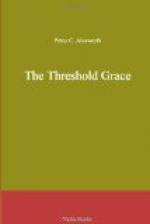All the true definitions of things are written in the soul. It was here that the Psalmist found his definition of evil. ’The Lord shall keep thee from all evil; He shall keep thy soul.’ Then evil is something that threatens the soul. It is not material, but spiritual. It is not in our circumstances themselves, but in their effect upon the inward life. The same outward conditions of life may be good or evil according to their influence on our character. Good and evil are not qualities of things. They have no meaning apart from the soul. The world says that health and wealth are good, and that sickness and poverty are evil. If that were true the line that separates the healthy from the sick, the rich from the poor, would also separate the happy from the miserable. But we find joy and sorrow on both sides of that line. We are drawn to look deeper than this for our definition of good and evil. We have to make the soul the final arbiter amid these conflicting voices. Here we must find the true definition of evil. The first question we ask when we hear of a house having been burnt down is this: ‘Was there any loss of life?’ All else lies on a vastly lower plane of interest and importance. So must we learn to distinguish between the house of circumstance, or the house of the body, and the soul that dwells in it. The only real loss is the ‘loss of life,’ the loss of any of these inner things that go to make the soul’s strength and treasure. The man who has lost everything except faith and hope has, maybe, lost nothing at all. There are some among the pilgrims of faith to-day who would never have been found there had not God cast upon their shoulders the ragged cloak of poverty; and if you know anything about that band of pilgrims you will know that the man who outstrips his companions is often a man who is lame on both his feet.




